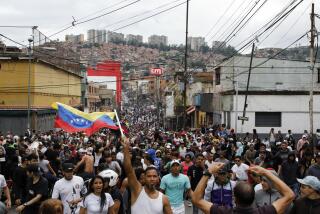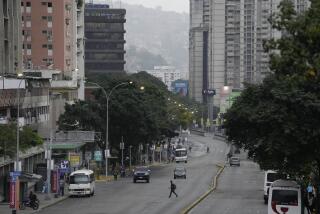Businessman Leads in Vote for Guatemalan President
- Share via
GUATEMALA CITY — Businessman Alvaro Arzu appeared late Sunday to have won the Guatemalan presidency, mainly because of his strong support in the capital, where 35% of voters live. Arzu had captured 54% of the vote when the Guatemalan electoral tribunal announced preliminary results with two-thirds of the ballots counted.
Arzu also benefited from higher voter turnout in the capital, where 46% of Guatemala’s registered voters cast ballots, compared with about 35% in rural areas. The winner of Sunday’s runoff election between two right-wing candidates--the top vote-getters in a field of 19 candidates who competed in November’s first round--will take office Jan. 14, with less than a week to make the transition from the current administration of President Ramiro de Leon Carpio.
Arzu, a 49-year-old former Guatemala City mayor, swept the capital, winning 2-1. His opponent, Alfonso Portillo, had a slight lead in the countryside with 175 of the 330 counties reporting, but it did not appear to be enough to offset Arzu’s victory in the city.
“You have made it possible for the people of Guatemala to live better during the next four years,” Arzu told cheering supporters outside his party headquarters late Sunday.
Arzu had been widely expected to win. He led the first round of elections with 36.5% of the vote, and preelection polls had projected that he would receive 62% of the vote. He has promised to implement free-market economic reforms and has said that during the first year of his administration he would complete current peace talks to end Guatemala’s 35-year civil war.
Portillo pledged that if he won, he would name former dictator Efrain Rios Montt to head a new security committee that would have more power than the defense minister. The 44-year-old Portillo openly ran as a proxy for Rios Montt--who was banned from seeking the presidency because of his role in a 1982 coup--with the slogan, “Portillo to the Presidency, Rios Montt to Power.”
Portillo tried to capitalize on the former general’s support base in the countryside while virtually ceding the capital to Arzu, who is remembered fondly here for improving the flow of traffic and getting city finances on a sound footing.
However, the tremendous popularity of Rios Montt does not appear to have rubbed off on his protege. Portillo’s name was not even mentioned during the midday service at the Christian Church of the Word, the evangelical church that supplied many of Rios Montt’s advisors when he became president following the 1982 coup and that remains a bastion of support.
“The case of Efrain is an injustice, the result of unjust laws,” Juan Velasquez shouted to the congregation, referring to the former general’s banned candidacy. “That is why we do not know who to vote for, why we are confused.”
Arzu supporters appeared sure of their choice. Blue and yellow ribbons--the colors of Arzu’s National Advancement Party--were tied around trees in the medians of the capital’s major avenues, and Arzu banners were strung overhead.
More to Read
Sign up for Essential California
The most important California stories and recommendations in your inbox every morning.
You may occasionally receive promotional content from the Los Angeles Times.













